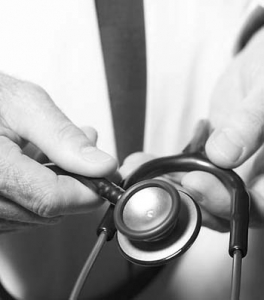Medical Malpractice Happens Everywhere.
 Sometimes, medical malpractice occurs in the privacy of your doctor’s office. In such a case, the doctor who commits medical malpractice is legally responsible for any injuries caused by his/her misconduct. The doctor’s group or practice might also be responsible under a legal theory known as respondeat superior, a long-held rule that holds an employer liable for the acts of an employee. The next time a clumsy waiter spills soup on your lap, try to remember that the Red Robin is also responsible for the cost of your dry cleaning. The “agency” relationship between the waiter and the restaurant provides you with a direct line of recovery.
Sometimes, medical malpractice occurs in the privacy of your doctor’s office. In such a case, the doctor who commits medical malpractice is legally responsible for any injuries caused by his/her misconduct. The doctor’s group or practice might also be responsible under a legal theory known as respondeat superior, a long-held rule that holds an employer liable for the acts of an employee. The next time a clumsy waiter spills soup on your lap, try to remember that the Red Robin is also responsible for the cost of your dry cleaning. The “agency” relationship between the waiter and the restaurant provides you with a direct line of recovery.
But what about malpractice that occurs in a hospital? Is it always hospital malpractice if the malpractice happens to take place in a hospital? The answer is “maybe.” Or more precisely, “it depends.”
If the doctor who commits malpractice is actually employed by the hospital, the hospital would be responsible. Likewise, if the malpractice is committed by a nurse who is employed by the hospital, you’d have hospital malpractice.
But what if the malpractice occurs in a hospital emergency room? Is that automatically hospital malpractice? The answer to this question is “probably.” Or more specifically, “it’s usually hospital malpractice, but it depends on the circumstances.”
If the emergency department physicians are employed by the hospital, it’s a no-brainer. But many emergency departments are staffed by doctors who are supplied by an outside medical group.
Does the absence of a direct employment relationship between the hospital and the physician stand in the way of holding the hospital responsible?
The answer is “no.”
People usually don’t go to an emergency room because of the particular doctors who staff them. They go to the emergency room because it’s nearby, or because it is connected to an established hospital. Or because they saw the hospital advertise its emergency services. Such patients are looking to the hospital for care. And for them, the law can hold the hospital responsible, even if the doctor is not a hospital employee.
Lawyers call this situation one of “ostensible agency.” It’s a legal fiction. It’s the courts saying that they will create an agency relationship when patients reasonably believe there was an agency relationship. Sounds complicated? It’s not. It’s just another example of the courts creating rules that reasonably accommodate real-world situations and reasonable expectations.
Hospitals in Pennsylvania can also be held “corporately liable” for malpractice within the hospital.
If the hospital fails to check the qualifications of the doctors or nurses who mistreat you, the hospital can be vicariously liable for the acts of those doctors and nurses, and can also be independently liable for having hired them in the first place. So, if the surgeon who left a sponge in your belly had studied in an unaccredited medical school in Islamabad, and had no license to practice medicine outside of East Waziristan, the hospital could be responsible for the very obvious breakdown in its credentialing process.
In Pennsylvania, hospitals also have a duty to use reasonable care in the maintenance of safe and adequate facilities and equipment, a duty to oversee all persons who practice medicine within its walls as to patient care, and a duty to formulate, adopt and enforce adequate rules and policies to ensure quality care for its patients.
A hospital’s failure to satisfy any of those obligations may render it liable under Pennsylvania law.



